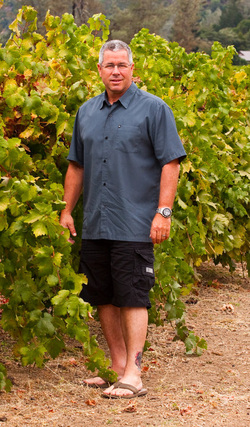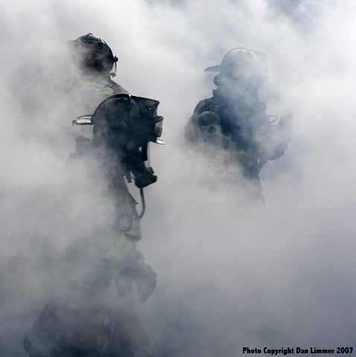
1. What is your current title & some of your previous experience?
Right now I am a Safety Training Manager for Bigge Crane & Rigging, my career was ended 7 years ago lifting a 650lb pt. Even with 6 people total, the years of lifting people finally took its toll. Over the course of 25 years I did Search & Rescue for the Navy, Combat Medic in the Army and was a firefighter and/or medic.
2. What is your favorite part of working for your department?
To sound corny I have to say taking someone at their worst and giving them the opportunity to be on this earth with their loved ones for a little while longer. With some it might be an hour, day, week, month or years, but it is more time than it would have been if it wasn’t for the team work of the EMS crew that responded to you. Also every day is different, you never know what that shift holds for you and is continuously keeps you on your toes, wanting to expand your knowledge and give the best possible care.
3. How do you define success?
In this career, to me success in the field of EMS is doing your best each and every day, working with a team to achieve a goal and striving to learn something new every day and pass on the knowledge that you have to those willing to learn. Knowing that we can’t save everybody, but we can sure give them our best and in the end of the day being able to look yourself in the mirror and feel good about yourself.
4. What have you learned over your lifetime that you'd like to share with the younger generation?
1 - To the EMT’s, you’re not JUST an EMT, you are responsible for the important things like Airway, Breathing and Circulation. Don’t just be a driver, ask questions, be part of the team, understand why your medic partner is doing what he/she is doing so that when you are in that seat you will want to teach your EMT partner. It only makes a better team and that is always better for the patient. 2 – Leave your prejudices at the door, you are not there to judge anyone, no matter who they are. Everyone is part of someone’s family and you need to treat them as you want your family treated 3- Don’t be a “clipboard” medic, don’t be afraid to get down to your patients level, touch them and let them know you are going to do everything you can to help them, but don’t lie to them. Once you do that and they catch you, your credibility is shot and that cooperative patient is now an uncooperative one. And lastly 4 – If you ever get burned out, dread that pager or tones going off and don’t want to be there, then turn in your uniform and stay home. When those people call 911 they are expecting and should get someone that truly wants to be there and care for them, not someone just going through the motions, you need to hold on to why we got into this field in the first place.
5. What is your favorite hobby?
Fishing, hiking, biking, running and photography.
6. Who has had the greatest influence on you?
Jim Holbrook, my paramedic instructor at Crafton Hills College in Yucaipa. That man was absolutely amazing and really knew how to bring out the best of all of his students. He would do scenario’s, like the one time he walked in, threw up coffee grounds and lay on the ground and said “now treat me”. He would have us do our assessment and treatment and when it got to the point of “at this time I would establish and I.V” he would have us do it. By the end of the day he would be walking around with band aids all over his arms. Absolutely incredible, and if he can teach me A&P, he could teach anyone.
7. What will be your legacy? Is the world better because of you/your work/your influence?
I think everyone in EMS would like to think so, that there is something they leave behind or a life they touched that will be their legacy. I was lucky to have both. I was responsible for getting the Flex Guide ET Tube Introducer implemented into the field in the Riverside
Division AMR. The use of that device in the field has helped medics get the tough intubations that at other times would be hard to get. The other was that I was able to help teach EMT’s on how to be a medic, not necessary try to make them a like me, but to show them what they already had inside of them to truly get what we, in EMS, are here for. One such EMT was my friend Eric Williams, he was an incredible EMT, a sponge for knowledge. I always told him that no matter what the situation, no matter how bad it is, always remain calm on the outside, because your patients, the people that called you, need reassurance that you got this. He was great with people, had incredible skills and he always remained calm. He took that knowledge and training and became a Combat Medic in the Army, assigned to 82nd Airborne Division and was a flight medic. At his funeral this July one of the soldiers he saved after being shot numerous times remembers dying and opening his eyes. He said that he expected to open his eyes and see how bad his injuries were on Eric’s face, but
instead when he opened his eyes all he saw was Eric’s goofy smile and in a calm voice Eric said “ I see you zigged when you should have zagged huh Jones”. When I heard that story I knew that what I had shown him what he had inside continued to help save numerous soldiers in Iraq and Afghanistan. He was killed July 23rd, 2012.
8. What's the funniest work story/ event you remember?
There are so many, but one that sticks out is when we had just watched “Super Troopers” at the station and we got a call for shortness of breath. When you are out in the field for a long time you pretty much get a feel for your patients and how you can converse with them. We arrived on scene and the firefighter bet me I couldn’t say “legs” 10 times in my assessment. After initial assessment on the patient and vital signs and sensing she had a good sense of humor “Ma’am, did your legs hurt before your shortness of breath?” “no”, I asked a couple more questions then “ When you breathe in deep do your legs hurt?” “no” – after asking multiple questions and getting the “legs” reference in about 6 times she looked at me and said with a big smile “Super Troopers?” “yes ma’am” “how many more do you have to go?” “4” “go ahead and get it over with” – it was pretty funny. One other time is I always taught my EMT’s to call their patients by either their name or sir/ma’am, not sweetheart, dear or anything like that. One time we went on a 90ish y/o female and I had my EMT doing the assessment and he kept calling her “sweetheart”. After the second time she looked annoyed and after the 4th time she said “young man, are we dating?” The EMT said no and she told him that her name was Dorothy and not sweetheart. It was classic and he never called a patient sweetheart or dear again.
9. Is there anything I haven't asked about that you would care to comment on?
To the medics, I can’t emphasize enough about making your partner part of the team. Let them run the calls at times and help them improve their skills under your direction. It all comes down to basics regardless of what letter is after EMT. I’ve seen too many medics get the “paragod” mentality and all they do is limit themselves, isolate the people around them and rob their patients of the best possible care. We are not here for our egos and accolades, we are here for that person in front of you looking to you for help, we owe it to them to give them the best possible care.
10. What is your favorite dinner & what do you drink with it?
Anything BBQ, especially ribs and my homemade BBQ sauce that actually will be on the market hopefully early next year. But besides that one of my favorites is chicken on a bed of artichokes marinated with dry vermouth topped with mushrooms and salsa mixed with cheese, with baked artichokes with garlic olive oil, balsamic vinegar and garlic pepper served with a nice Papapietro Perry Pinot Noir 2007
Perry Churchill
Safety Training Manager
Bigge Crane

 RSS Feed
RSS Feed
